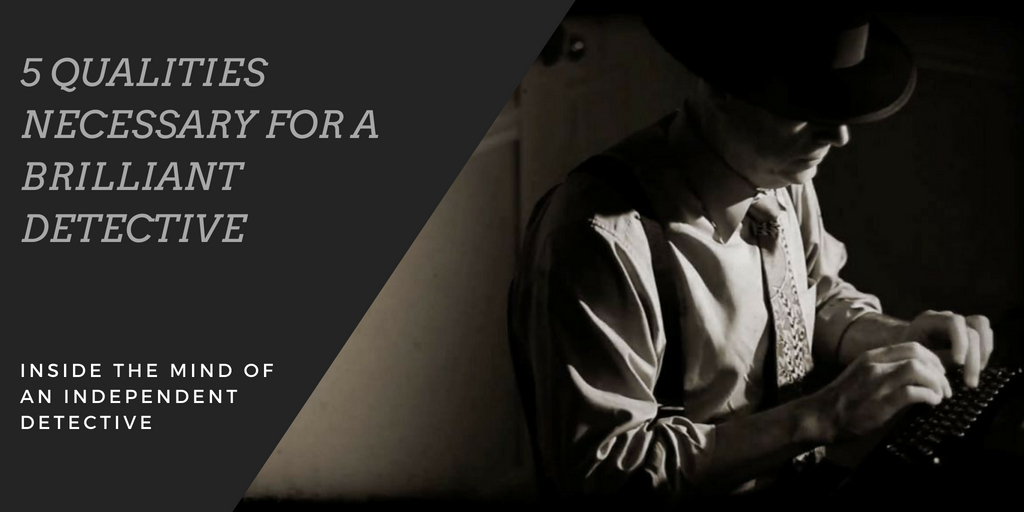
Private Detectives or independent detectives can either work on their own or be a part of an organization.
However, much of an effective freelance detective’s success will not depend on the organization or management, but it is attributed to their ability to scrutinize, collect, analyze, compile and find answers from information gathered during investigations.
A good rapport with law agencies, crime branches, and law enforcement is equally important for a freelance investigating officer for case resolutions.
What It Takes To Becoming An independent Detective?
Whether you are a detective on a police force, the CBI, FBI or are a freelancer, you must have certain skills and qualities to excel at your work. However, as a freelance detective or investigating officer, you will be expected to handle cases professionally and acutely, by your own, while having sound judgment and critical thinking ability.
Although experience does count, you also have to go beyond and above and use the road not taken in order to get the job done.
Measure Your Skills against these 5 Qualities Necessary for an Independent Detective
1. Gut Instinct
Use Your Sixth Sense
Call it your sixth sense or the subconscious mind, mastering the art of reading a crime scene is the most important and imperative skill a detective should possess. Gut Instinct, a tickling sensation behind your neck that we most often ignore is what you should work on.
Duncan McNab is a former detective turned true-crime journalist and author. Duncan explains about a detective’s gut instinct, “Good coppers who know their business and have the right skills and experience gain instinct. They can look at crime and think [that] the likelihood of X being responsible is pretty good. What you don’t do is then try and build your evidence to support what you think. Let the evidence take you there”.
A good investigating officer will immediately review and evaluate the pros and cons of evidence and facts about a particular person he has a gut feeling about. A seasoned detective would immediately smell foul play or interesting happenings the moment he walks into a room.
To accomplish this, you need to have a clear conscience and presence of mind, while of course, as and when you progress, your gut instinct will sharpen.
2. Communication and Interrogation Skills
Read People As Subtly Yet Clearly As Water
Communication skill is quite the backbone of an investigating job. Freelance or not, Detectives must interview or rather interrogate clients, victims, witnesses and suspects. As a detective, you have to also work discreetly and at the same time extract as much detail as possible from people.
One of the important elements of communication is reading people. It is similar to gut instincts, and the ability to read a person’s body language. It can help you to identify suspects easily and then work on them to find more evidence.
“You have to be able to talk to kings and crooks, all levels of people,” says Belinda Neil, a former police detective, hostage negotiator, and homicide investigator.
“Information can come from unlikely sources, you have to be able to maintain confidences. It’s more intense in a hostage situation because it’s all about communication. If you’re talking to someone face to face, you have to be so mindful of not only trying to read the person but also of your own body language…You’re trying to read the situation while also remaining neutral because people can pick that up, even on the phone, confirms Neil.
3. Have An Emotional Check
Be Patient Yet Persistent, Do Your Groundwork
In many cases, a detective may have to deal with issues that can make him angry or emotional. You will face such turmoil too. However, expressing any kind of negative or overwhelming emotion can harm the case, because evidence tampering and may even lead witnesses to hold information back.
Not only will you have to create a safe environment but also empathize and acknowledge at the right places to make witnesses and possible criminals share secrets comfortably. And, while we talk about emotional balance, we should also take in to account an insurmountable amount of patience.
Methodology and meticulous approach are paramount in investigations. Without a team to support, as a freelance detective, you will have to trawl through everything and not become impatient for answers while doing so. Because impatience can make you neglect important things.
“It’s a hard methodical slog. You don’t dismiss things until you have a good reason to. It’s almost like an accounting procedure sometimes. You have to be very precise, you don’t ignore things, you don’t assume things. Every incident needs to be investigated, wrapped up, dismissed or proceeded with. The chronology has to be right and the mechanics of what happened have to be substantiated…Be really cold about it and establish your facts”, says McNab.
4. Think Critically And Analytically
Use Your Brain To Its Fullest Capacity
You wouldn’t be served with the evidence and facts in a platter, in sequence. You have to pull out every statement and facts obtained during the investigation and piece them together. And in order to do so, you must be a good critical thinker and a great problem solver.
In many cases you will face contradictory witness statements; this is the time you have to use your analytical skills and critical thinking abilities to figure out what exactly must have happened. Critical thinking allows you to approach a situation with an open mind, without getting a tunnel vision.
“Be open to other people’s ideas and thoughts, but be suspicious, nonetheless”, points out Neil.
“You have to be brutally objective of yourself “, adds Duncan. Once you’ve got everything wrapped up and think it’s good, take a step back and an objective look to make sure you haven’t made the mistakes that other people do. It happens, we’re all human.
5. Research And Writing Skills
Have A Birds Eye View On Everything
Most often you will have to look up backgrounds and histories of victims, witnesses, and suspects. If business, law, and finance are involved, you have to further dig deep and research into company policies, taxation, action, accounts, and financial histories.
You should master the skill of conducting systematic and relevant research, and use the information to write reports and documents. Writing clearly and concisely is vital for a detective, especially when cases involve litigation and law enforcement.
Recommended Articles ;
How to Become a Detective (Private and Police)
How Much Can You Earn Annually As A Detective?




